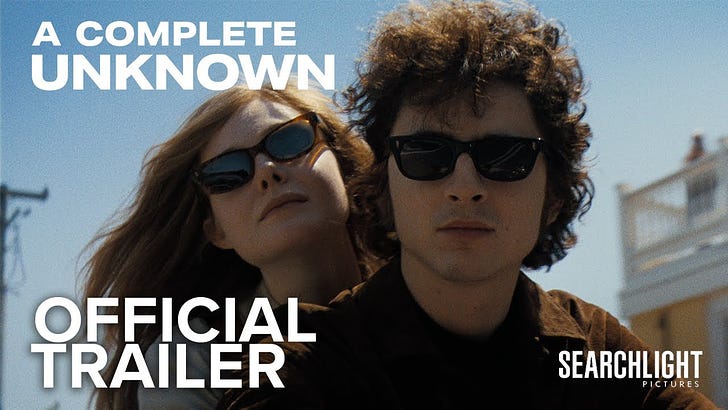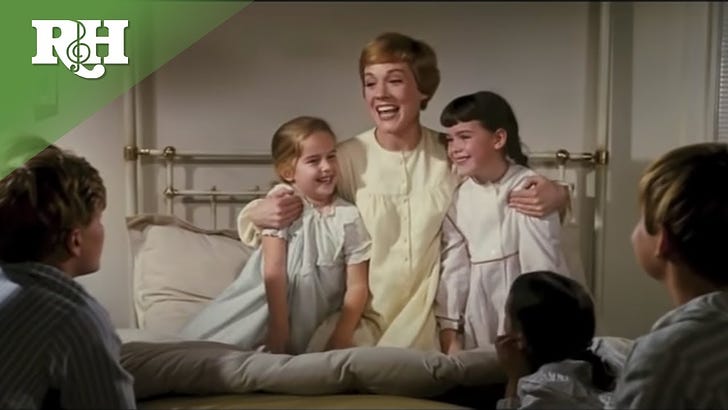Biopics Suck
Sorry, but Oscar contenders like 'A Complete Unknown' and 'Rustin' cannot beat 'Weird: The Al Yankovic Story' when it comes to 'non-fiction' movies.
Want to talk pop culture with us in person? We’ll be sharing behind-the-scenes secrets from our many collective decades writing about entertainment at The Common Good bookstore in Ellenville, New York! Join us May 15 in the Hudson Valley for our panel discussion, Turn Your Fandom Into a Writing Career.
The recent Oscar-bait Bob Dylan biopic A Complete Unknown could be one of three things: 1. one of the worst biopics to ever biopic; 2. a hilarious parody of biopics; or 3. an avant-garde work, a participatory biopic in which the audience directly experiences the absence of dramatic obstacles between Dylan and a life of adulation, by feeling bored.
About halfway through this film—it’s hard to say when, it becomes such a haze—I hit pause and looked at my sister, a fellow Dylan fan watching it with me. “Why is this so exhausting?” I asked. As we discussed it, we realized: The protagonist had no problems, his story had no stakes. According to the movie, he showed up in New York and almost immediately gained an audience with folk legends Pete Seeger and Woody Guthrie, who is dying in a hospital from Huntington’s Disease. The two men nod in deep appreciation as young Dylan plays them a tune. Soon Dylan’s at an open mic in the West Village being introduced by Seeger, and playing right after the on-the-rise Joan Baez. Everyone nods in deep appreciation. From there, Dylan is quickly signed and on his way to stardom. He plays many, many music festivals, and everyone nods in appreciation. He juggles two beautiful girlfriends, Baez and political organizer Sylvie Russo, who nod in appreciation and also have sex with him. This man, at least according to this movie, overcomes zero odds. He’s just super sexy and famous and talented and appreciated, and yet somehow he becomes belligerent anyway by the end of the film.
This was one of my many breaking points of late when it comes to biopics.
Films telling “true” stories about “real” people have long served as a fast track to Oscar nominations—Bohemian Rhapsody, Darkest Hour, Green Book, King Richard, Elvis, Oppenheimer, Rustin, and Maestro are among the other prominent examples of the last ten years. Even when these movies don’t bring home gold statues, they often still dominate online discourse from the casting phase on through to the release. (Please see: the upcoming Beatles biopics.) I understand this. There’s a distinct pleasure in seeing a famous person’s life acted out, especially the more intimate moments we could never see, and it’s often fun to see one famous person doing an impression of another famous person. (My sister, watching A Complete Unknown, said, “I like seeing the guy playing the guy.”)
But biopics can also do real damage: For one, actors doing impressions end up taking attention and awards away from more artful performances of people who are, simply, characters. For another, they almost always rewrite history into a market-tested storyline, permanently warping the general public’s view of historical events.
Biopics have been a staple of the cinema since nearly the beginning: The silent Custer’s Last Fight, a film about the U.S. Army officer in the Civil War, came out in 1912. In 1939, Henry Fonda played the title character in Young Mr. Lincoln. Many biopics have counted among the greats, like 1967’s Bonnie and Clyde and 1984’s Amadeus. The Oscar has gone to 12 Best Actors and 10 Best Actresses for playing real people since 2000.
In an attention economy, it’s easy to see why biopics are so alluring for studios. Someone like Bob Dylan, a known and worshipped figure, becomes something like a superhero franchise—audiences recognize the name and are more likely to shell out to see something about him than they are for a movie about, well, an actual complete unknown. Meanwhile, these productions attract quality actors who get a shot at an Oscar. Everyone, it seems, wins.
Except that, like superhero movies and other major franchises, the biopics take up valuable cultural capital that could have gone to original movies with more interesting parts for actors to win Oscars by playing. I’m thinking, for instance, of Kieran Culkin’s screen-blistering role as the charismatically disturbed Benji Kaplan in Jesse Eisenberg’s A Real Pain this year. I noticed even while I was watching—what a refreshing pleasure, to watch an original, character-driven film with something to say and a well-crafted script from start to finish. Every Bob Dylan is kicking a Benji Kaplan out of the running. For the record, I liked Timothée Chalamet’s performance as Dylan; I found his SAG Award acceptance speech for the role quite charming. But his performance deserved a better script.
Meanwhile, these “non-fiction” films are rewriting history bit-by-bit, which I understand—as a non-fiction author, I’ve often wished I could massage real events into more streamlined stories, a practice we seem to have decided is acceptable in movies about real people.
You’ve probably noticed this whenever you’ve watched one about a subject you already know a lot about. I had this experience with 2023’s Rustin. I’ve learned a fair amount about Civil Rights activist Bayard Rustin—the main force behind the March on Washington and a huge influence on Martin Luther King Jr.’s tactics—both through my research for my book When Women Invented Television, and, more significantly, from my mother-in-law, Dena Davis, who was a peace activist, knew him, and even lived in his former apartment at one point. So watching it with her and my partner, Jesse (who had recently read a biography of Rustin) was like the nerdiest version of Mystery Science Theater 3000: Biopic Edition. Many people who were not burdened by such knowledge loved the film, and I’m thrilled that more people now know about this man.
On the other hand, the movie is unusually meddlesome with history. For instance, it makes A.J. Muste, a pioneering labor activist who subsequently became a leader in the Civil Rights and peace movements, into a two-dimensional bigot, a mere symbol for the homophobia Rustin experienced, when, in fact, Muste was Rustin’s chief mentor. Their conflict over Rustin’s sexuality was more subtle than that depicted in the film. Muste came from a previous generation that believed in respectability politics and scolded Rustin for his promiscuity, which Muste believed could damage both Rustin and the movement.
And this is significant because it points to a larger issue with the film, which is that it makes Rustin a much simpler hero than he really was. While the movie acknowledges the tension between Rustin’s imprudent sexual relationships and his goals in the peace and Civil Rights movements, it was his promiscuity that sidelined him. He could be reckless and stubborn at times, insisting on a world that just didn’t exist yet—one that would accept him as Black, gay, and a leader while still allowing him his total sexual freedom. He’s right, and the world he existed in was wrong, but isn’t that interesting?
I understand the impulse to celebrate him by rushing past the complications of his sexuality, but they’re also what makes him most intriguing to me. He insisted on his freedom to be everything he wanted to be, but he paid a price for it that included his near-erasure from history, the very erasure this film seeks to remedy. But in making him more palatable to a mass audience, the movie actually repeats the oppression visited upon Rustin by the world in which he lived.
One of the film’s driving plots is also fabricated, perhaps also out of the impulse to make Rustin more acceptable to the masses: Rustin’s romance with a married preacher involved in the movement. Tellingly, their relationship makes for some of the best scenes and most interesting conversations, because the writers felt free to push them in whatever direction made for the best plot. But in the end, this also feels like a device to evoke more empathy for Rustin in mainstream audiences, who could feel badly about his longing for someone he couldn’t have and feel the swoon of this grand romance … that didn’t exist. This may ultimately have less impact on viewers’ perceptions of history, but as one of the most memorable elements of the film, it skews the story of Rustin even more for millions of Americans who, having seen the scripted movie, are less likely to watch a documentary about him or read a biography that might be more accurate. (Brother Outsider, incidentally, is a wonderful documentary about him.)
A Complete Unknown and Rustin represent the twin pressures of biopics, and show why they’re so hard to do well. A Complete Unknown messes with the truth, but in ways that, at least to me, seem less consequential to the story, making a girlfriend amalgam character and smashing together a few music performances in a movie that is rife with music performances. But it’s lacking a gripping plot arc and, perhaps to the film’s credit, it isn’t afraid to make him look like a jerk. Rustin, on the other hand, flattens history and makes it wrong in order to build an arc and make him more likable.
I would like to offer up a third option that gets it right: Weird: The Al Yankovic Story. It brilliantly points out everything that is wrong with traditional biopics, while offering an impressionistic view of its subject’s life—and serving as great entertainment, too. The movie, starring Daniel Radcliffe as the parody-song master, hits every biopic beat hard, and with a wink. A young Al flouts his domineering father’s authority, insisting on taking up the accordion instead of working a respectable job in a factory. With his awe-inspiring talent, he rocks a polka party; spontaneously writes a hit song about a bologna sandwich; and gets a major record deal. He finds himself at a star-studded pool party, and is seduced by Madonna, played with scene-chewing relish by Evan Rachel Wood. In case any viewers were, by this point, deluded enough to think some of this might be true, the couple unites to infiltrate a dangerous drug lord’s inner circle. I won’t spoil the final few “twists.”
And yet when I just typed “Did Weird Al” into my Google search, it auto-completed “date Madonna,” some very circumstantial evidence for the fact that someone, somewhere might have thought some of this happened for real. More concretely, a number of websites addressed the question when the film came out. Even this obvious biopic parody confuses viewers into thinking they’re witnessing some real history.
I love the way that Weird builds its story arc via exaggerated critique of the form. We want our biopic heroes to overcome childhood difficulties and break from the norm, to display otherworldly talent that propels them out of their ordinary circumstances, to hobnob with recognizable celebrities as a measure of their own success—and, why not, to heroically try to take down a drug cartel from within alongside one of the biggest and sexiest pop stars in history. The movie does all of this while giving us an insight into Yankovic’s mind, parodying the life of a parody master, rather than into his much more grounded (and boring) story of work, talent, and luck leading to success.
I realize this is not a highly repeatable trick. But it reminds me of the much artsier 2007 film I’m Not There, in which director Todd Haynes tells a nonlinear story inspired by the life and work of Dylan, with the likes of Christian Bale, Cate Blanchett, Richard Gere, and Heath Ledger playing different aspects of Dylan’s personae—it may or may not work for you, but it feels like Dylan. Similarly, one of the best Dylan movies ever made, 2013’s Inside Llewyn Davis, isn’t about Dylan at all. It follows a fictional young musician trying to make it in New York’s folk scene right around the time Dylan arrived, and failing; he is the anti-Dylan, loosely inspired by slices of Dylan associate Dave Van Ronk’s life. In this movie, the Coen brothers get at the essence of the time while retaining imaginative license over the story. Viewers know they’re not learning facts, but they might feel the essence.
Inside Llewyn Davis ends with the arrival of a Dylan-like figure in the West Village folk scene, portending doom. The events of A Complete Unknown are about to unfold, heralding the arrival of a new chapter in music—and a much worse movie.








Great article, Jennifer! Thanks for your insight into the nature of how twisted biopics can be! Now I really want to see the Weird Al movie!💕
Will there be a recording of that panel discussion? Would love to check it out!